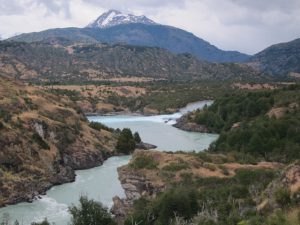Seven days ago I waited for a busy weekend, the first weekend in February. On Friday we hosted a neighboring family for dinner at our house. On Sunday we hosted a group of friends for a Super Bowl party. Seven days later and all of it is in the past. Now, in writing of it to you, I’m turning last weekend into a piece of history. I’m remembering it intentionally.
Both events were wonderfully successful. Great memories already. As memories, as the past, they are “Up River,” like the view in the photo. I see time flowing like a river, one way, ahead, to the next. Using the River construct, the past is Up River and the future is Down River.
Today I’m doing some Up River thinking. I fix my mind on last weekend’s activities. Knowing what I do now, would I have changed anything?
I’m illustrating, in a small way, the use of the past for the future. You can do this for your personal life, work life, whatever. Let’s see how it unfolds.
First, my interpretative memory exerts great weight in the reflection about last weekend. As I said, both events were outstanding. That happy conclusion will affect my recall, my reflection back for lessons learned.
My instinct, then, is to rush beyond this point of recognizing success. After all, countless experts tell us failure has so much more to offer the reflective mind.
If I slow down a little, I begin to realize that maybe success has a lesson after all. Where possible, I should try to replicate those parts of the events that made for last weekend’s successes. But here it gets tricky. Same type of meal preparation? Same type of guest lists? Same type of scheduling? Something else? You don’t want to take replication too far or you risk going stale, rote, and formulaic. The fun drains away when you lose the spontaneity.
Second, I do find a negative after thinking about it. Sitting here now, I recall the events as wonderful evenings. True. But what I don’t recall with equal clarity is an image of me—in the midst of either Friday or Sunday—sitting back and soaking in the pleasure of good company, good friendship, and good times. I don’t remember doing that, at least not in a manner that stayed with me as a memory. To use popular jargon from today’s mindfulness trends, I wasn’t present, I wasn’t in the moment. So, this is what I’d change. I’d be aware enough so I could remember having been present—and thus take the first step in adding that awareness-driven image to my collection of memories.
Third and finally, my ability to find lessons from last weekend will be weakest if they are only mine. The more people I involve in reflecting on last weekend, the richer, deeper, more vivid the scene becomes. Do it alone and you’ll be limited. Do it with other people and you’ll see a better picture.
And now to you. Think of a recent event, positive or negative, that has left you with a clear memory of the occasion, its nature and substance. Next, ask what you would do differently, knowing what you now know.
We’re putting the past to work. Thanks for reading. All the best, Dan








